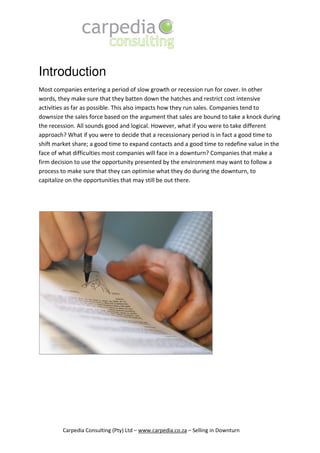Market Downturn: Did Retail Investors Capitalize On Professional Selling?

Table of Contents
Understanding Professional Selling During Market Downturns
"Professional selling," in the context of market downturns, refers to the liquidation of assets by large institutional investors such as hedge funds, mutual funds, and pension funds. These entities often adjust their portfolios based on macroeconomic factors, risk assessments, and the need for portfolio rebalancing. Several reasons drive professional selling during market declines:
- Risk mitigation: Professionals may sell assets to reduce overall portfolio risk in anticipation of further market declines.
- Portfolio rebalancing: To maintain a desired asset allocation, professionals may sell over-performing assets to buy under-performing ones, creating selling pressure in certain sectors.
- Forced selling: Margin calls, triggered by significant market drops, can force institutional investors to liquidate assets to meet their obligations.
This professional selling often creates increased volatility, leading to:
- Increased volatility leading to selling pressure: As large institutions sell, it creates a cascade effect, further depressing prices.
- Meeting margin calls forcing liquidation: This forced selling can exacerbate downward pressure on asset prices.
- Strategic portfolio adjustments to reduce exposure to declining sectors: Professionals may actively divest from sectors deemed particularly vulnerable during a downturn.
Retail Investor Behavior During Market Downturns
Retail investors, often driven by emotion, frequently react to market downturns with fear, panic, and sometimes, the fear of missing out (FOMO) on a potential rebound. This emotional response can lead to several behavioral patterns:
- Panic selling leading to losses: Selling assets at the bottom of a market downturn often locks in losses.
- "Buy the dip" strategy and its potential successes/failures: While attempting to capitalize on lower prices, timing the market perfectly is extremely difficult and can lead to further losses if the market continues to decline.
- Dollar-cost averaging as a mitigating strategy: Regularly investing a fixed amount regardless of market fluctuations can reduce the impact of market timing.
Analyzing Opportunities for Retail Investors
Professional selling can create opportunities for astute retail investors. Undervalued stocks and sector-specific selloffs can present attractive entry points. However, identifying and capitalizing on these opportunities is challenging:
- Identifying undervalued assets requiring thorough due diligence: Requires careful research and analysis to differentiate between genuinely undervalued assets and those facing fundamental problems.
- The importance of a long-term investment strategy: A long-term perspective can help retail investors weather short-term market volatility and benefit from eventual price recovery.
- Risks associated with timing the market: Trying to time the market's bottom is inherently risky; it's difficult even for seasoned professionals.
Data and Case Studies
Analyzing data from recent market downturns reveals mixed results for retail investors. While some successfully capitalized on opportunities presented by professional selling, many others suffered losses due to emotional decision-making.
- Specific examples of stocks that dropped significantly due to professional selling but recovered: Research specific examples of stocks that rebounded after an initial drop, illustrating the potential for recovery.
- Statistical analysis of retail investor returns during a specific downturn: Use statistical data (if available) comparing the performance of retail investors with indices to assess their success.
- Comparison of average retail investor returns versus institutional investor returns: Analyze whether retail investors performed better or worse in comparison to institutional investors during specific market downturns.
The Role of Market Timing and Risk Tolerance
Successfully capitalizing on professional selling during a market downturn is heavily influenced by market timing and risk tolerance. Investors with higher risk tolerance and a longer-term investment horizon are better positioned to weather market volatility and benefit from eventual price recoveries. Conversely, investors with lower risk tolerance might be more likely to sell at a loss during periods of panic.
Conclusion
Our analysis reveals a complex picture. While some retail investors successfully navigated recent market downturns and capitalized on opportunities created by professional selling, many others experienced losses due to emotional reactions and poor timing. The key takeaways emphasize the importance of:
- Understanding the dynamics of professional selling during market downturns.
- Developing a robust investment strategy that aligns with your risk tolerance and long-term goals.
- Avoiding emotional decision-making and relying on data-driven analysis.
Understanding market downturns and learning to identify opportunities from professional selling is crucial for every investor. Continue your financial education and develop a well-informed strategy for navigating future market volatility. Proper research and a long-term perspective are key to successfully navigating future market downturns and potentially capitalizing on professional selling.

Featured Posts
-
 Mike Breen On Marv Albert A Discussion Of The Greatest Nba Announcer
Apr 28, 2025
Mike Breen On Marv Albert A Discussion Of The Greatest Nba Announcer
Apr 28, 2025 -
 Another Round Richard Jefferson And Shaquille O Neals Ongoing Rivalry
Apr 28, 2025
Another Round Richard Jefferson And Shaquille O Neals Ongoing Rivalry
Apr 28, 2025 -
 Mets Rival A Pitchers Unexpected Dominance
Apr 28, 2025
Mets Rival A Pitchers Unexpected Dominance
Apr 28, 2025 -
 The Countrys Emerging Business Hubs A Geographic Analysis
Apr 28, 2025
The Countrys Emerging Business Hubs A Geographic Analysis
Apr 28, 2025 -
 Espn Forecasts Red Sox 2025 Season A Risky Prediction
Apr 28, 2025
Espn Forecasts Red Sox 2025 Season A Risky Prediction
Apr 28, 2025
